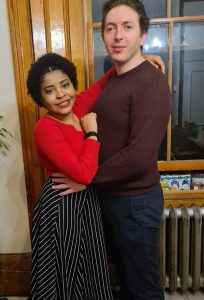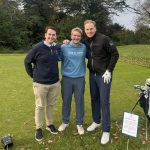
At the back of my mind…living with a brain tumour
Spilled sambuca
The symptoms started when I was working as a bartender in Australia, pouring shots for punters. My right hand started shaking. Then I dropped a tray of champagne flutes, to loud cheers from all.
Back in the UK, a GP whose name I wish I could recall, noticed nystagmus (“dancing eyes” colloquially), often indicative of a “cerebellar deficit”, and I had an MRI scan on my head. I entered Canterbury Hospital as an undergraduate law student. I left as a brain tumour patient with a two-year life expectancy. I was 21.
Ushered into hospital in London, medical terms previously only know through books, quickly became familiar. General and local anaesthetics (3 of the former, 8 of the latter). Cerebro-spinal-fluid. Cannulas. Lumbar puncture. Bacterial meningitis. Mastoid air cells. Ganglioglioma. The biopsy coughed up a name, a long, complicated name that makes a good password. Now it’s a part of me. Perhaps it always was – an inspection of childhood pictures showed tell-tale signs of a squinty eye and tilted head due to one-sided muscular weakness. The “eloquence” (more medical lexicon) of its location mean that the risks of resection far outweigh any benefits. The tumour will never be removed.
Denial
Two months and 11 operations later, I was discharged from King’s and began an arduous path through the stages of grief that often follow a life-altering event. I joined a gym in order to regain some of the strength and weight that I had lost, a practice that I maintain to this day. I am a brain tumour patient and always will be but remained in denial (the first stage) until my grades started slipping.
Benign
Normalisation comes through communication. I’m communicating. Let’s talk about the word “benign”, the medical antonym of “malignant” and consigned to the “not dangerous” category. I have poor balance, muscle weakness, fatigue, memory loss, reduced function in my right eye and ear, slurred speech, and take strong medication that induces high dependency. I fall over most days. I walk into things. I’ve been refused entry into establishments on account of drunkenness (I’m teetotal), which unfortunately, the above symptoms can present as. I rely on my “good” (left) side and have just about mastered the art of carrying two drinks in one hand. Medically, “benign” means “not harmful”. Anecdotally, “benign” has little application in the world beyond hospital.
Life
After drifting relatively aimlessly through different industries, I have since settled into a discipline and company that I have found to be accepting and inclusive, and where I am always learning professionally. I have adjustments. My team look out for me. I have flexibility to attend regular MRI scans and hospital visits. For this, I am eternally grateful. Of the five stages of grief, I have since reached the final stage: acceptance. I am blessed to have an endlessly understanding, loving, patient, and kind wife. Adjectives do her no justice. Not to mention my wonderful family and friends. Deus está comigo. There are many people in this world with hidden disabilities. For my part, writing and sharing this brings catharsis.
Sometimes the “hidden” comes to the surface, and not of my own volition. Colleagues may notice my shaking, slurred speech or difficulty walking. As a friend told me at the time of diagnosis, life has given me a rock. But it’s my f****ng rock.
There are fantastic charities out there to help those diagnosed with all types of tumours, such as Brainstrust and The Brain Tumour Charity. They have offered me non-judgmental, unparalleled support. Amongst the maelstrom of emotions, intermittent hospital appointments and self-education, I have realised the key to my recovery; I am not alone.







